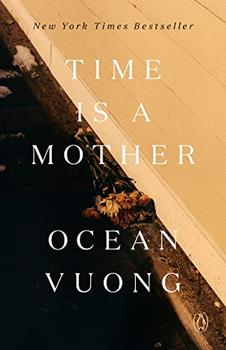Summary | Excerpt | Reviews | Beyond the Book | Read-Alikes | Genres & Themes | Author Bio

This article relates to Time Is a Mother
Language and communication are key themes throughout the work of Ocean Vuong. In both his fiction and poetry — including his newest collection, Time Is a Mother — he discusses the difficulties his mother faced as a Vietnamese immigrant living in the U.S. who didn't read, write or speak English.
Historically, being a melting pot of people from around the world, the U.S. was a polyglot nation, with the use of multiple indigenous and immigrant languages accepted as the norm. Historical studies on this subject suggest that at the time of independence, the first language of a third or more of American residents was something other than English.
The arrival of World War I in 1914 significantly curtailed immigration to the U.S., and the subsequent global depression and stricter immigration quotas compounded rising feelings of hostility towards newcomers. Prior to this, minority languages often died out from generation to generation anyway, as immigrants assimilated, however willingly or unwillingly. While linguistic diversity has been on the up again, there has been rising anti-immigrant sentiment in recent years, including a surge in anti-Asian harassment and hate crimes. The harmful and discriminatory "speak English!" mentality has seen a resurgence, having been lent credence by far-right politicians and the media.
There are many reasons why some immigrants struggle to pick up English, not least a lack of accessible learning support. Many countries offer comprehensive government-sponsored language learning classes for new immigrants, but the U.S. has no such federal program. Instead, immigrants often rely on adult education classes run by non-profits and local schools, which are estimated to be serving only about four percent of those in need. Recent studies show that American residents who do not speak English receive about a third less health care than other Americans. Health care facilities that are federally funded are required to have interpreters, but these laws are often unenforced.
The lack of accommodation for those who don't speak English has many negative consequences. Vuong has detailed his mother's experience with the American health care system, for example: Having gone to the hospital with severe back pain, she was sent home with a heat patch. Concerned that not enough had been done, Vuong took his mother back to the hospital and spoke on her behalf. Tests revealed she had stage IV breast cancer that had spread to her spine and bone marrow. As he explained it:
"I thought, here we are again: I have to speak for you. I have to speak for your pain. I have to verbalize your humanity. Because it's not a given. Which is the central problem with how we value Asian American women."
Despite not understanding English, Ocean Vuong's mother was a proud supporter of his work. When she attended his readings, she would face the audience, using their reactions to interpret the emotion and impact of his words. This, Vuong explains, taught him an important lesson about human empathy that transcends language:
"As a woman of color, an Asian woman, in the world, she taught me how to be vigilant. How people's faces, posture, tone, could be read. She taught me how to make everything legible when language was not."
Filed under Society and Politics
![]() This "beyond the book article" relates to Time Is a Mother. It originally ran in June 2022 and has been updated for the
June 2023 paperback edition.
Go to magazine.
This "beyond the book article" relates to Time Is a Mother. It originally ran in June 2022 and has been updated for the
June 2023 paperback edition.
Go to magazine.
Your guide toexceptional books
BookBrowse seeks out and recommends the best in contemporary fiction and nonfiction—books that not only engage and entertain but also deepen our understanding of ourselves and the world around us.